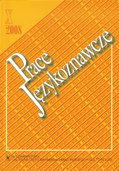Grzeczność w językowej interpretacji mieszkańców wsi (na przykładzie wypowiedzi z regionu lubelskiego)
Linguistic politeness in villagers’ interpretation (a study based on spoken texts from the Lublin region)
Author(s): Halina PelcowaSubject(s): Language and Literature Studies
Published by: Wydawnictwo Uniwersytetu Warmińsko-Mazurskiego w Olsztynie
Keywords: linguistic politeness; greetings; respect-related words; village; sociolinguistic and cultural changes
Summary/Abstract: The article discusses the language picture of rural politeness as seen through the prismof sociolinguistic and cultural-dialectological research. At present, the model of politenesswhich has functioned in the rural context and which is based on traditional values, such as kindness, modesty, honesty, readiness to help, gratitude and respect for human dignity,appears to be a matter of the past rather than the present. The model is reflected in theuse of expressions such as: bądźcie z Bogiem ‘Go with God, God bless’, Boże dopomóc, Bożedopomóż do roboty, Boże dopomóż, Boże pomóc, Bóg wam pomóż ‘Lord help me’, niechbędzie pochwalony Jezus Chrystus, niech będzie pochwalony ‘Praise be to God, Praisethe Lord’, szczęść Boże ‘God bless’, z Bogiem, zostańcie z Bogiem, ‘May God be with you’(lit. ‘Stay with God’), do widzenia ‘good bye’, dzień dobry ‘good morning’, in the majesticplural wy ‘you’ form with a polite -cie suffix employed when addressing older villagers,in the pronouns on ‘he’, ona ‘she’ used with reference to strangers, and in the imperativeforms expressing permission and invitation. When young people are addressed, villagersuse their names or the polite ty ‘you’-sg. form; however, when strangers are addressed,then the words pan ‘sir’, pani ‘madam’ are used. Yet more recently forms “alien” to thetraditional rural culture are heard more often as well. This change has an autonomouscharacter; it is a result of the customs-, civilization- and globalization-related processesas well as the generational change.
Journal: Prace Językoznawcze
- Issue Year: 23/2021
- Issue No: 2
- Page Range: 289-301
- Page Count: 13
- Language: Polish

